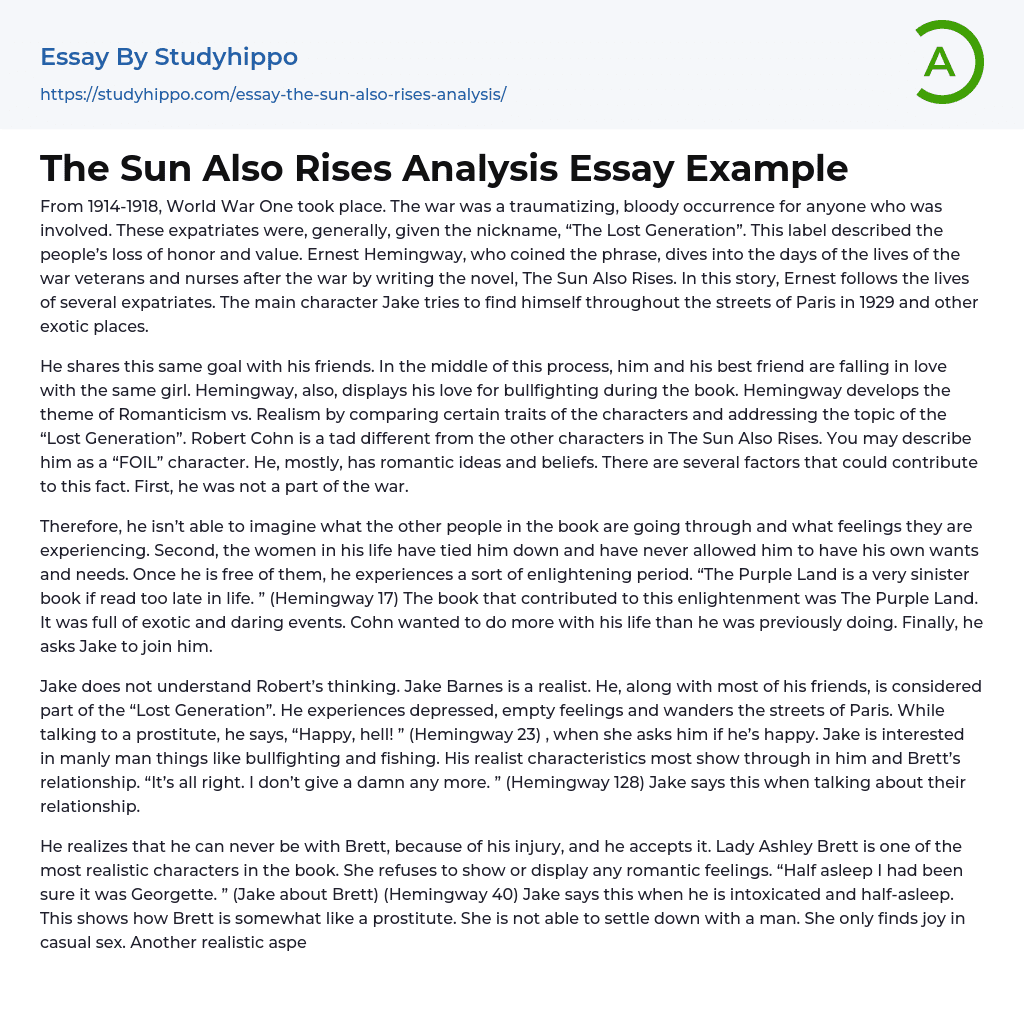Taking place from 1914 to 1918, the First World War was a period of tremendous hardship and turmoil for those involved. Characters who served in this war as expatriates were frequently referred to as "The Lost Generation," signifying their loss of dignity and respect. Ernest Hemingway was the first to use this term, particularly in his novel The Sun Also Rises, which delves into the post-war lives of veterans and medical staff. The story explores the experiences of several expatriates, focusing on main character Jake's journey towards self-discovery while traversing through Paris in 1929 and other captivating locales.
He not only aligns himself with the ambitions of his friends, but also develops feelings for a woman coveted by his closest mate as the narrative progresses. Hemingway's fascination with bullfighting is evidently woven into every
...part of the book. He masterfully portrays the conflict between Romanticism and Realism through contrasting character traits and exploring the concept of the "Lost Generation". Robert Cohn, a character in The Sun Also Rises who often plays the role of a "FOIL", diverges slightly from others characters. His viewpoints and values are predominantly romantic. This might be due to several reasons, one major being his non-participation in the war.
As a result, Cohn struggles to understand and connect with the feelings and experiences of others in the book. Moreover, his individual freedom has been curtailed by the females around him as they continually obstructed him from pursuing his aspirations. Nonetheless, after freeing himself from these constraints, he experiences a phase of enlightenment. "The Purple Land is alarmingly advisory when perused too far into one's life." (Hemingwa
17) The novel, The Purple Land was instrumental in triggering this fresh understanding within him. It was brimming with thrilling and adventurous tales that ignited Cohn's desire to achieve more than what he had accomplished up until then in his existence. Finally, he encourages Jake to join him on this journey.
Jake Barnes fails to comprehend the mentality of Robert. Being a realist, Jake, along with his companions, is affiliated with the so-called “Lost Generation”. He is frequently filled with feelings of depression and emptiness and often roams the lanes of Paris. His expression, “Happy, hell! ” (Hemingway 23), during a conversation with a sex worker when inquired about his happiness, clearly demonstrates his existential crisis. Jake holds interest in activities perceived as masculine such as bullfighting and angling. His realistic traits are particularly evident in his relationship with Brett. He expresses his indifference towards their relationship by saying, “It’s all right. I don’t give a damn any more.” (Hemingway 128).
Jake recognizes that his physical constraints bar him from having a romantic relationship with Brett, and he has reconciled himself with this brutal truth. Brett Ashley emerges as one of the most genuine and authentic figures in the novel. She consistently avoids expressing any romantic sentiments. Jake's half-awake statement "Half asleep I had been sure it was Georgette" (referring to Brett) (Hemingway 40), suggests that Brett could be compared to a courtesan due to her inability to uphold a commitment with any man, opting for transient sexual encounters instead. Her constant state of drunkenness introduces another aspect of authenticity to her persona. "These bullfights have worn me out. I'm as exhausted as
a rag" (Brett). "Don't worry, you'll get your drink" (Mike addressing Brett) (Hemingway 173).
The demonstration of Brett's excessive dependency on alcohol by Mike reveals her inability to stay totally sober in real life. She inevitably seeks escape from reality. By incorporating distinct personas and centering around "The Lost Generation", Ernest Hemingway has crafted the theme of Romanticism vs. Realism in his literary work The Sun Also Rises. An analysis of individual characters reveals specific qualities that categorize them as either romantic or realistic. Interestingly, Ernest Hemingway himself embodies both aspects. His thought process was grounded in reality, yet he also exhibited romantic notions.
- Book Summary essays
- Metaphor essays
- Reader essays
- Rhyme essays
- Literary devices essays
- Villain essays
- Books essays
- Genre essays
- Literary Criticism essays
- Writer essays
- Protagonist essays
- Simile essays
- Poem essays
- Book Report essays
- Book Review essays
- Greek Mythology essays
- Plot essays
- Tragic Hero essays
- Coming of Age essays
- Play essays
- Rhetoric essays
- Rhetorical Question essays
- Translation essays
- Understanding essays
- Reason essays
- Character essays
- Letter essays
- American Literature essays
- Literature Review essays
- Utopia essays
- Poetry Analysis essays
- Dante's Inferno essays
- Between The World and Me essays
- Incidents in The Life of a Slave Girl essays
- Flowers for Algernon essays
- Myth essays
- Everyday Use essays
- Boo Radley essays
- Genesis essays
- Richard iii essays
- Alice in Wonderland essays
- On the road essays
- Ozymandias essays
- The Nightingale essays
- Holden Caulfield essays
- Animal Farm essays
- 1984 essays
- A Hanging essays
- Shooting An Elephant essays
- A Tale Of Two Cities essays




